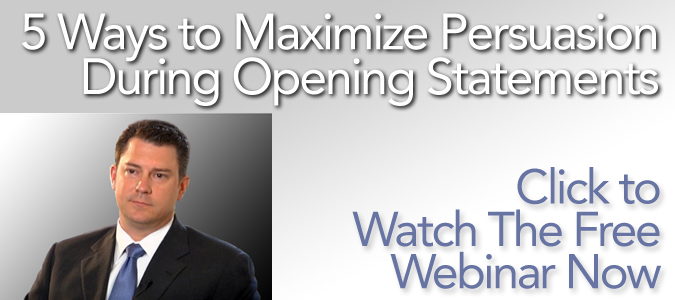Lawyers say a lot of things in court – but here’s a list of seven things that, for various reasons, you never want to hear yourself saying in court.
Number 1: “Your Honor, could I please have a moment to sort out this technical issue.” The middle of trial is not the place to fix your technical glitches – yet one hears lawyers utter this sentence all the time. With few exceptions, technical problems are almost entirely preventable. And in any case, you always have a backup plan, right? Take a look at these related articles for more background on this:
- 12 Ways to Avoid a Trial Technology Superbowl-style Courtroom Blackout
- Free Download: Which Courtroom Trial Technician Should I Use?
Number 2: “My client.” I believe the phrase “my client” should be banished from the lexicon of all litigators. Can you imagine anything more distancing? When you think about it, isn't “my client” just shorthand for “this person or organization who is paying me to say this”? Instead, humanize your clients and even turn them into heroes.
Number 3: “You might not be able to see this, but.” Well, make sure they can see it! All too often we see one of the simplest mistakes being made -- failing to create a presentation with text that everyone can read. A good presentation environment includes high-quality projectors, high-quality equipment and the use of font sizes on slides that are always larger than 20 and usually larger than 30. One can easily avoid this problem, and no apologies or explanations will be needed. See these related articles for more:
Number 4: “Take my word for it.” Just as above, if you find yourself saying something like “take my word for it” or anything that attempts to excuse the inadequate quality of a visual, you're just trying to explain away your error. This could be colors that are too light, too similar or even issues with a projector. With all the testing tools that are available to a litigator today, there's simply no excuse for this. These related articles provide additional guidance:
- Trial Graphics Dilemma: Why Can't I Make My Own Slides? (Says Lawyer)
- 24 Mistakes That Make For a DeMONSTERative Evidence Nightmare
Number 5: “Put yourself in his shoes.” Long known as the "Golden Rule" in jury trials, we still see lawyers from reputable firms make this mistake. The Golden Rule is said to be violated when a lawyer asks a jury to put themselves into the shoes of their client. I don't think it's an entirely intuitive rule, so it is understandable how mistakes are made. After all one is really just trying to help the jury understand? However this is a bright line, and you should avoid statements like: "reward my client as you would want to be rewarded" or "imagine how this suffering would feel and then pick the right damages figure." Learn more here.
Number 6: "Looking at my next bullet point." In general, the use of bullet points on your slides must be avoided. Judges and jurors alike will read them and not listen. Plus, people remember and understand less of what you both speak and show at the same time. We have written about this many times before, but my favorite article on the topic offers twelve reasons why bullet points are bad.
Number 7: "Notwithstanding," "But for," "Whereas," "Assuming arguendo," "Aforementioned," or "Heretofore" Alright, maybe sometimes you have to say "but for" when it is part of the law in question, but for (that one doesn't count) the most part you can strike (add that word to the list too) all of these from your courtroom vocabulary. Remember, you want people to relate to you. You want them to see you as approachable and trustworthy. You can achieve this by speaking to them as their family would speak to them and nothing more.







Leave a Comment